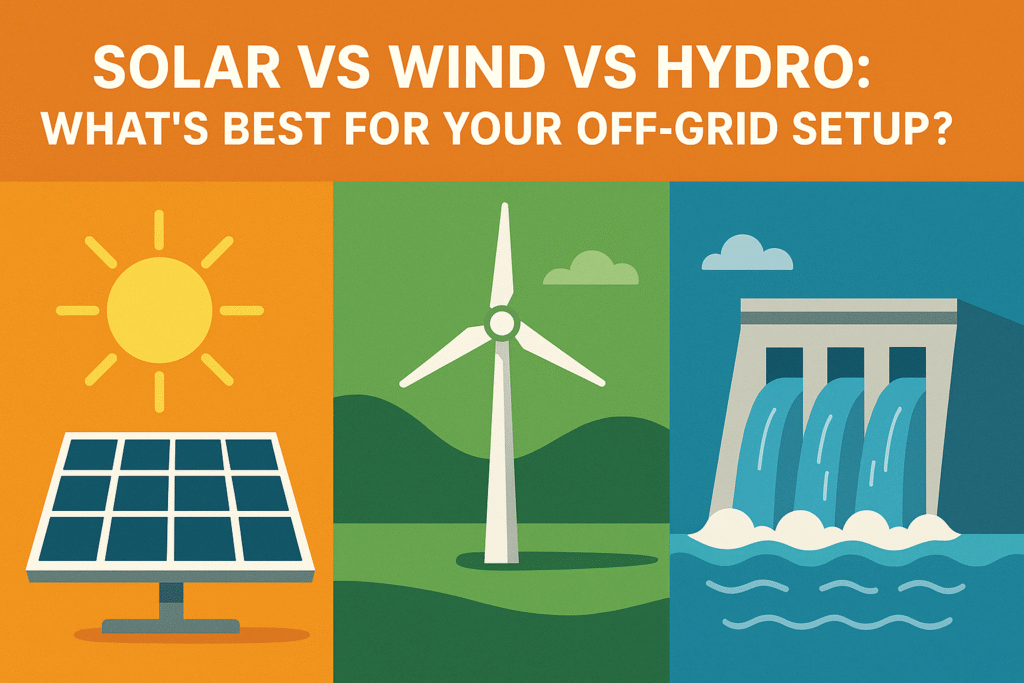
Living off the grid is more than just a lifestyle trend—it’s a movement. People across the world are choosing to disconnect from centralized energy systems and embrace energy independence, sustainability, and resilience. But to live off-grid successfully, one of the most critical decisions you’ll make is: Which renewable energy system is right for me?
In this deep dive, we’ll compare solar, wind, and hydro power solutions to help you find the ideal energy source for your environment, goals, and lifestyle.
☀️ Solar Power: Clean, Scalable, and Accessible
Solar energy is by far the most popular choice for off-grid setups—and it’s easy to see why.
Pros:
Universal Availability – If you have sunlight, you have power.
Low Maintenance – No moving parts means minimal upkeep.
Scalability – Add panels as your needs grow.
Silent Operation – Great for peaceful environments.
Cons:
Intermittent Output – No production at night or during overcast conditions.
Upfront Cost – Solar panels and inverters aren’t cheap (though prices are dropping).
Storage Needs – You’ll need a reliable battery bank to store unused power. (👉 Learn more in Battery Banks Demystified)
Ideal For:
Remote homes and cabins with ample sun exposure
DIYers and minimalists
People starting small and growing over time
Solar offers incredible flexibility, but it’s not perfect. If you’re building a robust, full-time system, understanding the limits of solar is key. Make sure to read our essential guide:
👉 The Ultimate Guide to Off-Grid Power: Solar, Wind, and Beyond
💨 Wind Power: A Strong Ally in the Right Conditions
Wind energy is often overlooked but can be a game-changer—if your site is suitable.
Pros:
Nighttime Generation – Complements solar by generating power when the sun sets.
High Output in Windy Areas – A small turbine can produce more power than a full solar array.
Year-Round Performance – Especially efficient during the winter months when sun exposure is lower.
Cons:
Site-Dependent – Not every location has consistent, usable wind speeds.
Maintenance – Moving parts require periodic servicing.
Noise and Aesthetics – Not ideal for stealth or serene setups.
Ideal For:
Coastal areas, open plains, or hilltops
Hybrid systems (solar + wind)
Off-grid homes needing reliable year-round performance
🌊 Hydro Power: The Hidden Off-Grid Champion
Before installing a turbine, do your research. One of the most common mistakes is assuming wind will be enough without solid data. Check out:
👉 7 Common Off-Grid Energy Mistakes to Avoid
If you’re lucky enough to have a flowing stream or river on your property, hydro might be your golden ticket to energy independence.
Pros:
24/7 Generation – Unlike solar and wind, hydro runs continuously.
High Efficiency – A small system can power an entire household.
Longevity – With proper maintenance, systems can last decades.
Cons:
Location-Specific – Requires a reliable water source with vertical drop.
Legal/Environmental Restrictions – Water rights and ecological impact can be a concern.
Installation Complexity – Requires permits, infrastructure, and long-term planning.
Ideal For:
Mountainous or forested properties with streams
Full-time off-grid living
Energy-intensive operations like workshops or small farms
Hydro power is rare, but for those who can access it, it may be the most efficient and reliable option on the list.
⚡ Comparing All Three at a Glance
Feature Solar Wind Hydro
Availability Very High Moderate Low
Initial Cost Medium High High
Maintenance Low Moderate Moderate
24/7 Output No Sometimes Yes
Scalability Easy Moderate Hard
Noise Level Silent Audible Low
Each system has its strengths—and its limitations. That’s why hybrid systems are gaining popularity, combining the strengths of two or more sources to ensure reliable power year-round.
🔋 Don’t Forget the Battery Bank
No matter which energy source you choose, energy storage is critical to your success off-grid. Without a proper battery system, you’re simply generating power without the ability to store it for when you need it most.
Choose between lithium-ion, lead-acid, and saltwater batteries
Understand charge cycles, depth of discharge, and battery lifespan
Invest in a quality inverter and charge controller
Learn the full story in our dedicated guide:
👉 Battery Banks Demystified
🛠️ Mistakes to Avoid When Designing Your System
Jumping into off-grid living without a solid plan can lead to wasted money, frustration, and outages. Here are common errors:
Overestimating production and underestimating consumption
Choosing the wrong battery capacity
Installing systems without a load assessment
Ignoring local climate factors
Avoid costly pitfalls by reviewing this must-read:
👉 7 Common Off-Grid Energy Mistakes to Avoid
🧭 Which System Is Right for You?
Ask yourself:
What natural resources are available on my land?
How much power do I realistically need?
Can I invest in a full system upfront, or should I grow in stages?
Am I ready for maintenance, or do I want a hands-off setup?
Here’s a simplified recommendation:
✅ Choose solar if you want something simple, modular, and widely applicable.
✅ Choose wind if your location is consistently windy and you want to balance solar.
✅ Choose hydro if you have flowing water and need consistent high-output energy.
For most people, solar + wind hybrid systems provide the most balanced approach. Add batteries and a backup generator, and you’re ready for anything.
💡 Real Stories: From Zero to Energy Independence
👉 From Zero to Energy Independence
Don’t just take our word for it. See how real people—from rural homesteaders to digital nomads—are reaching total energy freedom using creative combinations of these systems.
📚 More Articles to Supercharge Your Solar Journey
Want to go deeper into the world of off-grid and solar living? Check out these powerful resources from MuseGlobe:
👉 The Ultimate Guide to Off-Grid Power: Solar, Wind, and Beyond
Your all-in-one blueprint for mastering off-grid energy systems.
👉 7 Common Off-Grid Energy Mistakes to Avoid
Don’t fall into the traps that cost beginners time and money.
👉 Battery Banks Demystified
Everything you need to know about storing power safely and efficiently.
👉 From Zero to Energy Independence
Learn how real people are achieving total energy freedom—starting from scratch.
